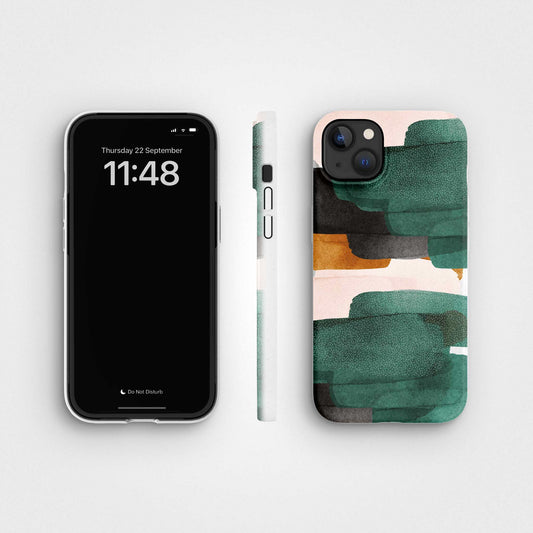Camping is a fantastic way to reconnect with nature, but it's essential to do so in a way that minimises our impact on the environment. As more of us are adopting eco-friendly practices, sustainable camping gear is getting super popular. In this post, we’ll check out some must-have eco-friendly items for your next camping trip, making sure you leave the campsite just as you found it – maybe even better. Let’s get packing!
Quick links
-
Tips for camping sustainably
-
Must-have eco-friendly camping items
-
Why choose sustainable camping gear?
Tips for camping sustainably
Before we get to the gear, let's go over some tips for camping sustainably. These simple steps can make a big difference in protecting the natural beauty of your campsite.
Rule number one - leave no trace
Always pack out everything you bring in, including trash and food scraps. Leaving waste behind can harm wildlife and spoil the natural beauty of the area. Bring along biodegradable bags for collecting trash and make an effort to pick up any litter you find, leaving the campsite cleaner than you found it. Only build campfires in designated areas and adhere to local regulations. Use a portable stove for cooking to reduce the need for firewood. If you do have a campfire, keep it small and controlled. Ensure it is completely extinguished before leaving the site.

Select eco-friendly toiletries
When packing for your camping trip, make sure to include eco-friendly toiletries. Choose biodegradable soaps and shampoos that break down naturally and don’t pollute waterways. Traditional toiletries often contain harmful chemicals, turning your relaxing nature getaway into an environmental disaster. Avoid these by choosing products labelled as biodegradable or environmentally friendly.
Natural sunscreens and insect repellents are another must-have. Look for mineral-based sunscreens that use zinc oxide or titanium dioxide, which are safer for both you and the environment. The same goes for insect repellents – steer clear of DEET-based products and opt for natural alternatives made with essential oils like citronella or eucalyptus.
You will feel much better knowing that your morning wash routine isn’t leaving a toxic footprint behind. So, pack wisely and keep it green – because nature deserves our best care, even when we're out in the wild.
Respect wildlife
Observe animals from a distance without approaching or feeding them. Remember, you're a guest in their home, not a server at their buffet. Feeding wildlife can alter their natural behaviours and diet, turning them into overeager beggars. Store food securely to avoid attracting animals to your campsite – the last thing you want is a raccoon ransacking your tent like it’s a midnight snack bar. And a bear rummaging through your cooler isn't the kind of close encounter you're looking for!
Be mindful of water use
Water is a precious resource, especially when you're out in nature. Use it sparingly and be careful not to contaminate natural water sources with soaps, shampoos, or food waste. When washing dishes or cleaning yourself, make sure to do so at least 200 feet away from streams, lakes, or other water bodies. This helps prevent harmful substances from entering the ecosystem and affecting wildlife.

When it comes to greywater (the water left over from washing dishes or bathing), collect it in a container and dispose of it properly. Pour it into a sump hole you’ve dug away from water sources, or use a biodegradable soap that breaks down naturally. Remember, even biodegradable soaps can be harmful in large quantities, so use them sparingly. Also, avoid washing directly in natural water sources – no one wants to drink your leftover soup or shampoo bubbles!
Use reusable and eco-friendly items
One of the easiest and most impactful ways to camp sustainably is by replacing single-use plastics with reusable items. Start with the basics: bring a reusable water bottle. This helps you avoid the waste of disposable plastic bottles and allows you to carry and refill your water supply throughout your trip.
Next, think about your dining setup. Swap out disposable cutlery, plates, and cups for durable, reusable alternatives. Bamboo or stainless steel cutlery is lightweight, sturdy, and perfect for camping. Pair this with reusable plates and cups to create a sustainable dining experience. Instead of paper napkins, pack cloth napkins – they’re easy to wash and can be used over and over again.
When it comes to food storage, ditch the plastic wrap and go for beeswax wraps. These wraps are reusable, biodegradable, and great for keeping your food fresh. Reusable silicone bags are another fantastic option for storing snacks and leftovers without the plastic waste.
Also, don't forget to bring reusable shopping bags for carrying your gear and groceries. They take up little space and are much more durable than plastic bags, which often end up as litter in natural areas.
Must-have eco-friendly camping items
With those tips in mind, let's look at some essential eco-friendly items to pack.
Reusable bottles
Staying hydrated is a must when you're out camping, and reusable water bottles are the way to go. Forget those plastic bottles and opt for something more durable like bottles made from recycled stainless steel. They're incredibly tough, perfect for handling drops, bumps, and the occasional rough handling that comes with outdoor adventures. Stainless steel bottles keep your drinks at the right temperature, so you can enjoy hot cocoa by the campfire or ice-cold water during a hike. Even better, consider a hybrid bottle that allows you to change the lid, transforming it from a bottle to a tumbler.



And the best part? You’re reducing plastic waste every time you refill.
Bamboo socks
Bamboo socks are another must-have item for campers. They are incredibly soft and gentle on your feet. Made from bamboo, which grows like a weed and doesn’t need any nasty pesticides or fertilisers, these socks are breathable, moisture-wicking, and antibacterial, so your feet will stay fresh and dry no matter how long you’re out in the wild.
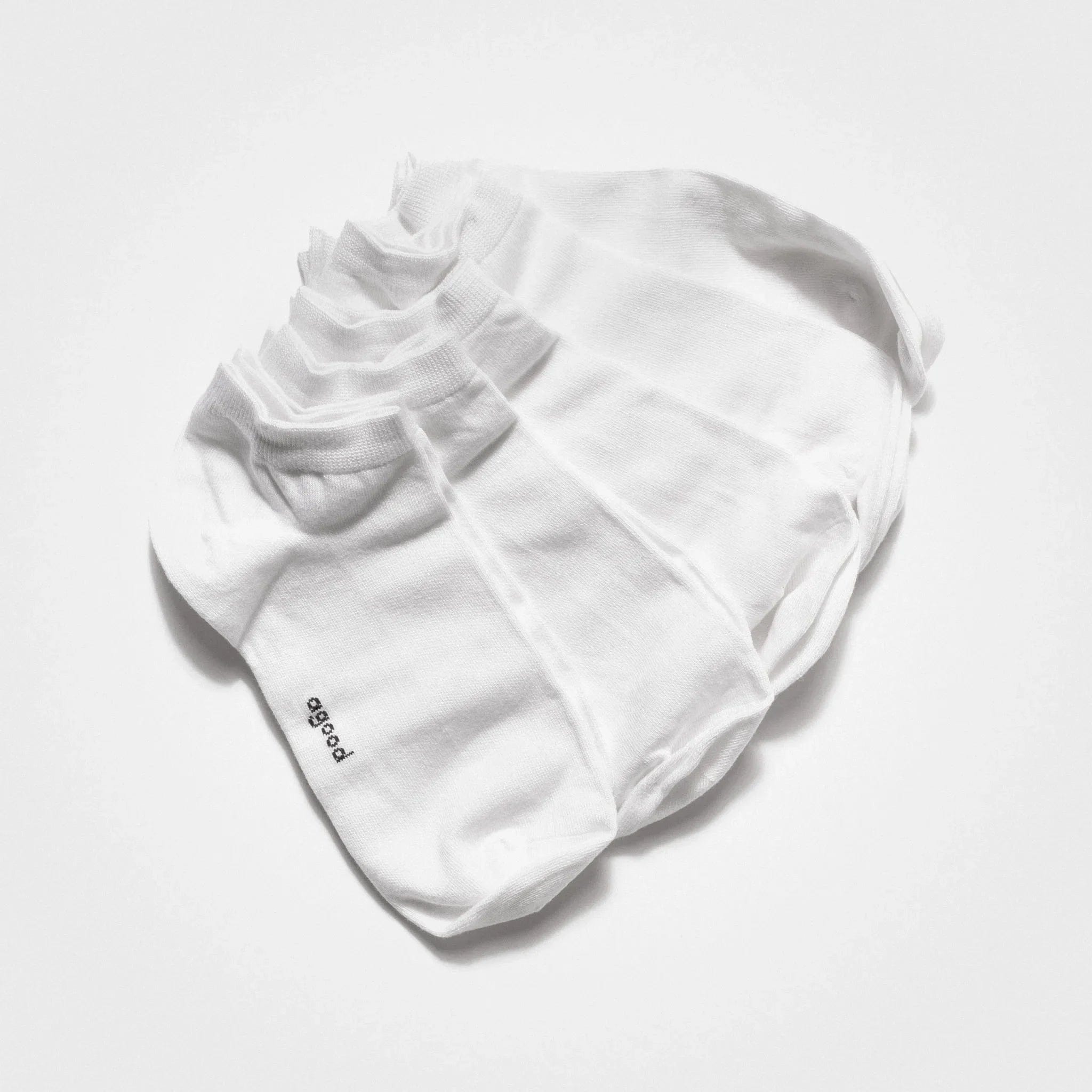
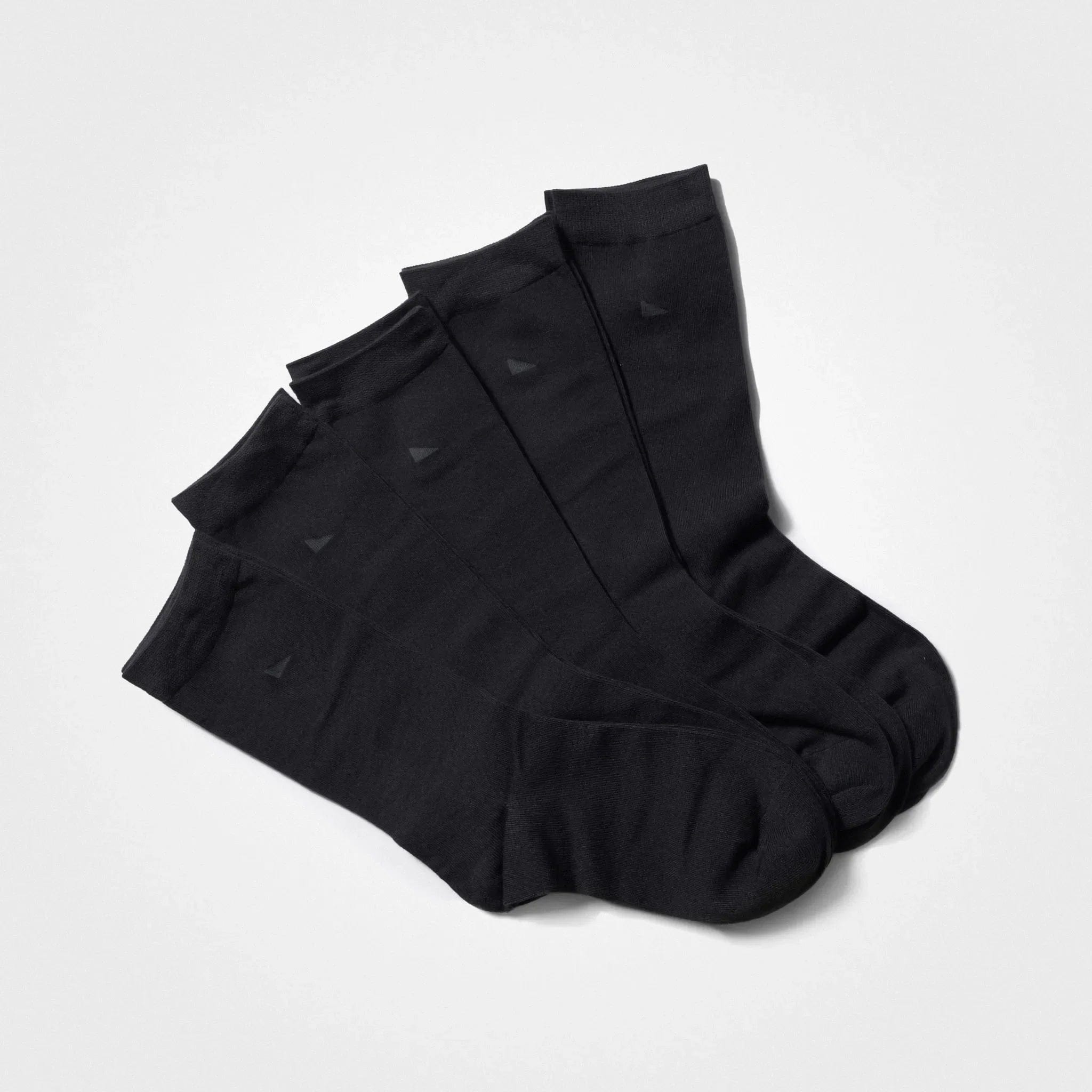
Bamboo toothbrushes
Keeping your teeth clean while camping is super important, and bamboo toothbrushes are a great eco-friendly choice. Unlike plastic toothbrushes, these are biodegradable and compostable, so you can brush without feeling guilty about the environment. They work just as well as plastic ones, giving you the same clean teeth but with a lot less waste.
Bamboo cutlery
Bamboo cutlery is a fantastic addition to your eco-friendly camping kit. Just like bamboo socks and toothbrushes, bamboo cutlery is made from a super-fast-growing plant that doesn’t need any chemicals to thrive. It’s lightweight, so it won’t weigh down your pack, but it’s also tough enough to handle all your camping meals. Plus, if you lose a fork or spoon, no worries – it’s biodegradable and won’t harm the environment. Making the switch to bamboo cutlery means you’re cutting out single-use plastics and enjoying your meals in a more sustainable way.
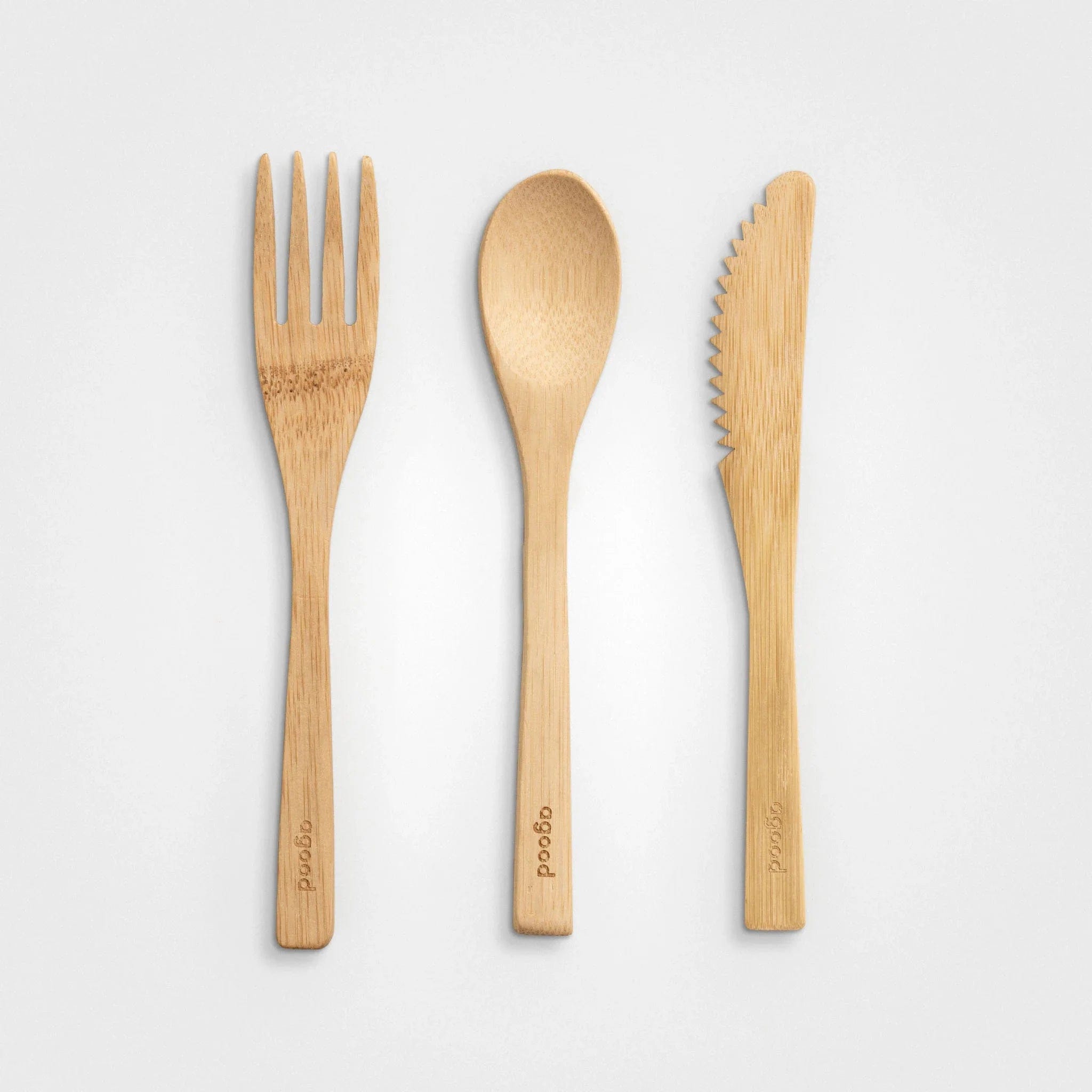
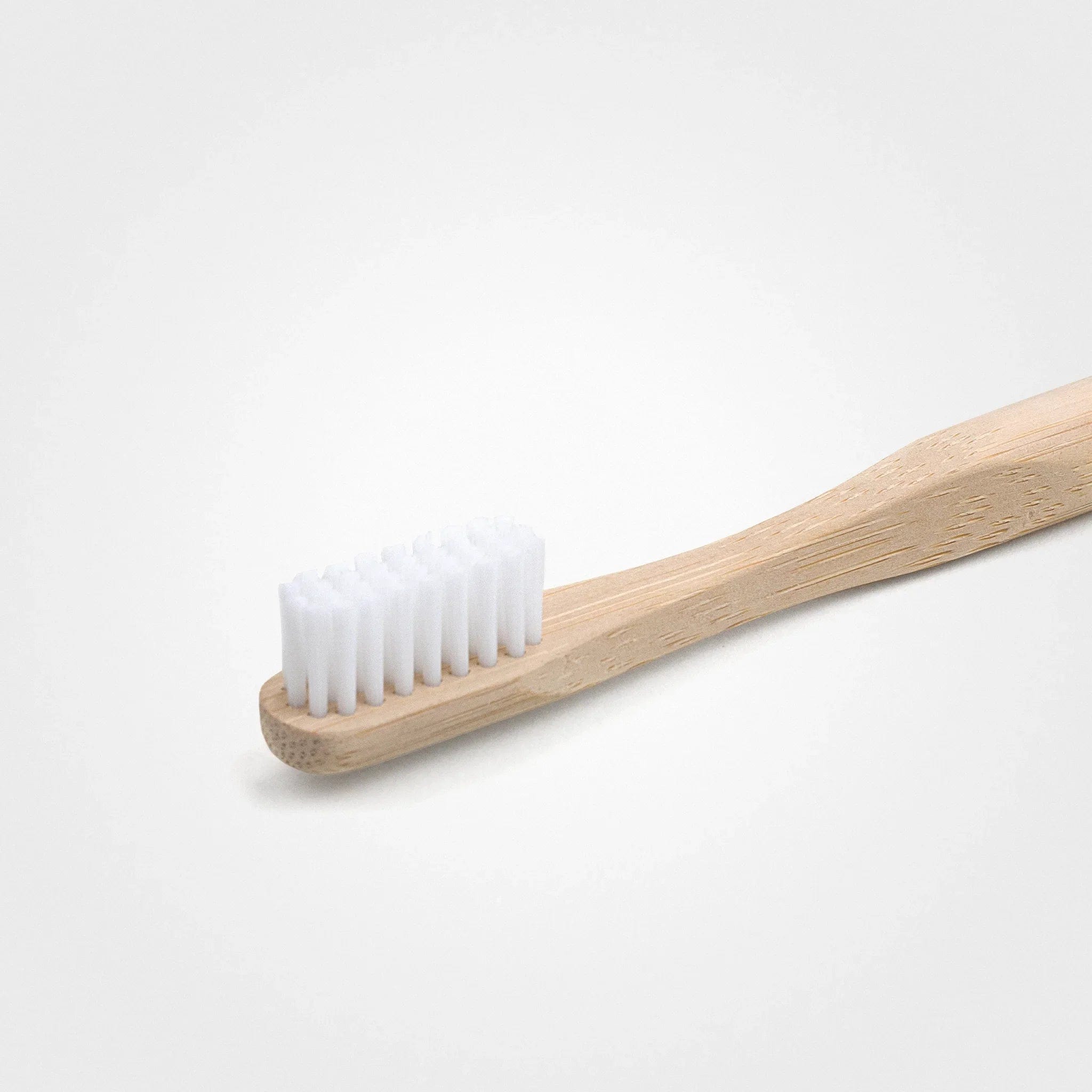
Wheat straws
Plastic straws are a major pollutant, but you don't have to give up convenience to be eco-friendly. Wheat straws are a perfect alternative, made from natural wheat stems and completely biodegradable. They're ideal for sipping your favourite beverages around the campfire without harming the environment.
Lunch box for kids made from recycled steel
When camping with kids, a lunch box made from recycled stainless steel is a great fit for your camping gear. This durable and lightweight lunch box is perfect for the outdoors, ensuring your little adventurers have their snacks and meals safely stored. Its compact size makes it easy to pack. Choosing a lunch box made from recycled materials provides a practical and safe option for your child and, most importantly, promotes sustainability from a young age.


Biodegradable wet wipes
Wet wipes are incredibly convenient for those quick clean-ups when you're camping, but traditional ones can be pretty bad for the environment. That’s where biodegradable wet wipes come in. Made from natural fibres, these wipes break down naturally and don’t contain any harsh chemicals, making them a much more eco-friendly choice. They’re also gentle on your skin, perfect for anyone with sensitive skin. Plus, they’re just as handy for keeping things clean around the campsite.
Plant-based phone cases
When you're out in the wilderness, your phone is your lifeline. It’s your map, your camera, and your means of communication. Protect it with a durable, eco-friendly phone case. Our plant-based phone cases are designed to withstand the rigours of outdoor adventures while minimising environmental impact. Made from sustainable materials, these cases are both stylish and sturdy.
Solar-powered gear
Solar-powered gadgets are a fantastic way to stay connected and powered up while minimising your carbon footprint. Solar chargers, lanterns, and even cookers utilise the sun's energy, reducing the need for disposable batteries and fossil fuels.
Eco-friendly sleeping gear
For a great night's sleep under the stars, choose eco-friendly sleeping gear. Look for sleeping bags and mats made from recycled or natural materials such as organic cotton, recycled polyester, and responsibly sourced down. These sustainable options are incredibly comfy. With durable and cosy options from brands that care about the environment, you can sleep soundly and wake up refreshed, knowing you've made the right choice.
Stone paper notebooks
Journaling is a wonderful way to document your camping experiences, and stone paper notebooks offer a sustainable alternative to traditional paper. Made from stone, these notebooks require no trees, water, or harmful chemicals in their production. They're also waterproof, making them perfect for outdoor use.

Why choose sustainable camping gear?
Choosing sustainable camping gear is a no-brainer for anyone who loves the outdoors. When you opt for eco-friendly gear, you are reducing your carbon footprint and also helping to preserve the natural beauty that makes camping so special. Traditional camping gear often relies on materials and manufacturing processes that harm the environment, contributing to pollution and resource depletion. By switching to sustainable alternatives, you’re supporting products made from renewable resources and environmentally responsible practices. This means less waste, fewer toxins, and a healthier planet for future generations to enjoy. Happy camping, and remember – leave no trace!













